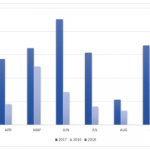In what has been an approximate repeat of the Monday overnight session, global stocks and US futures rose around the world as oil prices climbed toward $44 a barrel, with risk-sentiment pushed higher by another plunge in the Yen which has now soared 300 pips since the Friday post-payroll kneejerk reaction, and was trading above 109.20 this morning. At the same time base metals regained some of Monday’s steep losses following Chinese CPI data that came in line while PPI declined for 50 consecutive months however showed a modest rebound from the prior month on the back of China’s recent, and now burst, speculative commodity bubble.
The weaker yen was the main driver of overnight action: “The weakening yen is acting as a boost to stocks,” Yoshihiro Okumura, general manager at Chiba-Gin Asset Management told Bloomberg. “We’re seeing some risk-on moves overall. The key going forward is whether we’ll get a sense that all the negative earnings are over with now.” The yen weakened for a second day after Japan’s Finance Minister said the government can intervene to stabilize foreign-exchange markets if necessary. Japan’s currency fell against all its Group-of-10 peers after Taro Aso, speaking in parliament in Tokyo Tuesday, reiterated that the U.S. doesn’t object to the Asian nation’s policy. His comments came a day after he said “it’s natural that Japan has means to intervene” in the foreign-exchange markets.
“The increase in Japan’s talk about intervention is drawing market attention,” said Sean Callow, a senior foreign-exchange strategist at Westpac Banking Corp. in Sydney. “Japanese officials run the risk being ‘the boy who cried wolf’ if they keep talking without acting.” Considering they have been crying wolf all of 2016 after the disastrous NIRP experiment, one would assume the market has had enough, and yet here we are with a 300 pip squeeze in two days.

The MSCI All Country World Index’s 0.4 percent gain was its biggest in three weeks as Credit Suisse Group AG boosted European banks and Japanese shares rose. Nickel led a rebound in a Bloomberg measure of raw-materials prices as Japan’s largest supplier forecast a widening shortage. Philippine’s peso jumped the most in six weeks after Rodrigo Duterte called for “healing” after claiming victory in a presidential election and trading Europe signaled Brazilian markets would rebound as the move to oust President Dilma Rousseff appeared back on track. Optimism was dented by the latest industrial output print in Germany which declined more than expected in March while France’s unexpectedly fell highlighted the uneven nature of the recovery.
Cited by Bloomberg, Michael Hewson, a London-based market analyst at CMC Markets said that”people are slightly less risk averse now than they were end of April. Credit Suisse earnings weren’t great, but they were better than the worst of expectations. Still, the optimism is a little premature. Economic data hasn’t been very convincing.” So not great, but better than the worst expectations, and the result is a 1.5% jump in Europe and a 0.6% bounce in US futures. As a reminder, on Monday morning Goldman cuts its Stoxx 600 and Eurostoxx 50 forecast. Now we know why.
Some more details: the Stoxx Europe 600 Index advanced 1.3 percent as of 10:31 a.m. London time, with all of its industry groups rising. Lenders led the gains. Greece’s ASE Index rose 2.7 percent for the biggest rally among western-European markets. S&P 500 futures added 0.6 percent after the gauge closed little changed on Monday. Credit Suisse rallied 4.8 percent after posting a smaller loss than analysts estimated. Pandora A/S jumped 9.8 percent after the maker of charm bracelets reported better-than-projected results and raised its full-year forecast.
Market Wrap
Global Top News
Looking at regional markets, Asian stocks traded mostly higher after encouraging Chinese inflation figures supported a turnaround in sentiment. Nikkei 225 (+2.2%) outperformed as JPY weakness bolstered exporter sentiment, while ASX 200 (+0.4%) rebounded off its worst levels as strength in financials offset commodity weakness in which WTI crude futures declined below USD 44/bbl and iron ore dropped around 6%. Shanghai Comp (flat) recovered from opening losses after the latest China data release inspired an improvement in sentiment. Finally, 10yr JGBs were mildly lower as firm gains in Japanese stocks dampened demand for safe-haven assets while today’s 10yr auction also saw a decline in the b/c from prior.













Leave A Comment